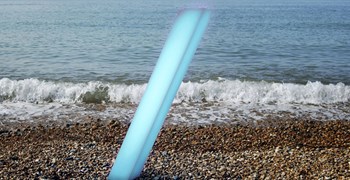The work of a genius: Dulwich Picture Gallery to hold exhibition on artist Winifred Knights
This article originally appeared on Culture24.
Dulwich Picture Gallery is at it again - this time uncovering the genius that was painter Winifred Knights
 Winifred Knights, Self-portrait, 1920, Pencil on tracing paper © Trustees of the British Museum.© Trustees of the British Museum. © The Estate of Winifred Knights
Winifred Knights, Self-portrait, 1920, Pencil on tracing paper © Trustees of the British Museum.© Trustees of the British Museum. © The Estate of Winifred KnightsThe gallery will be displaying them all in this overdue retrospective, together with an unparalleled selection of preparatory sketches and some stunning self portraits. The centrepiece is the apocalyptic The Deluge, from 1920, which attracted critical acclaim as "the work of a genius" and secured Knights the Prix de Rome scholarship in Decorative Painting from the British School at Rome.
The scholarship was a fitting reward for a painter who, during two spells at the Slade under the tutelage of Henry Tonks and Philip Wilson Steer, honed her meticulous compositional discipline and developed a love of Italian Renaissance painting. The five years Knights spent in Italy became the strongest unifying force in her work, fuelling her imagination in works such as Italian Landscape (1921) and View to the East from the British School at Rome (1921).
She saw Italy as a living landscape that revitalised her creative spirit and as a result she produced some of the most evocative pictures to come out of the British School at Rome: The Marriage at Cana (1923), Edge of Abruzzi, boat with three people on a lake (1924-30) and The Santissima Trinita (1924-30), all of which bridged Renaissance techniques with modernism to create the highly individual language that was her own.
“Although never part of the modernist avant-garde, Knights engaged with modern-life subjects, breathing new life into figurative and narrative painting to produce an art that was inventive and technically outstanding," says Curator Sacha Llewellyn.
"Knights’ works are also deeply autobiographical: presenting herself as the central protagonist and selecting models from her inner circle, she consistently rewrote and reinterpreted female figures of fairy-tale and legend, Biblical narrative and Pagan mythology to create documents of her own lived experience."
As well as the large selection of studies highlighting Knights’ early development as an artist and her meticulous approach to her paintings, the exhibition includes a series of beautiful self-portraits. Although she had previously outshone her male contemporaries at the Slade and the British School at Rome, when Knights returned to England in 1926 she struggled with the conventional chauvinism that then dominated the art world.
When World War Two broke out, Knights became distraught. Her only concern was for the safety of her son, bringing her already intermittent work to a standstill. She only began working again in 1946, a few months before she died of a brain tumour at the age of 48.
“Like so many women artists, heralded and appreciated in their own day, she has disappeared into near oblivion,” adds Llewellyn. “This exhibition, in bringing together a lifetime of work, will create an irrefutable visual argument that she was one of the most talented and striking artists of her generation.”
 Winifred Knights, A view to the east from the British School at Rome, 1921, Oil on panel.© Private Collection. © The Estate of Winifred Knights
Winifred Knights, A view to the east from the British School at Rome, 1921, Oil on panel.© Private Collection. © The Estate of Winifred Knights- Exhibition runs June 8 - September 18 2016. Follow the gallery on Twitter @dulwichgallery and Facebook.
What do you think? Leave a comment below.
More from Culture24's Art section
"It was an awesome moment": Artists climb 7th century cathedral to create series of artworks
Victorian Pastoral: Garden Museum acquires early Gertrude Jekyll photographs
Curator's Choice: A hidden section of a 17th century tapestry cartoon found in a seam at Chatsworth House












